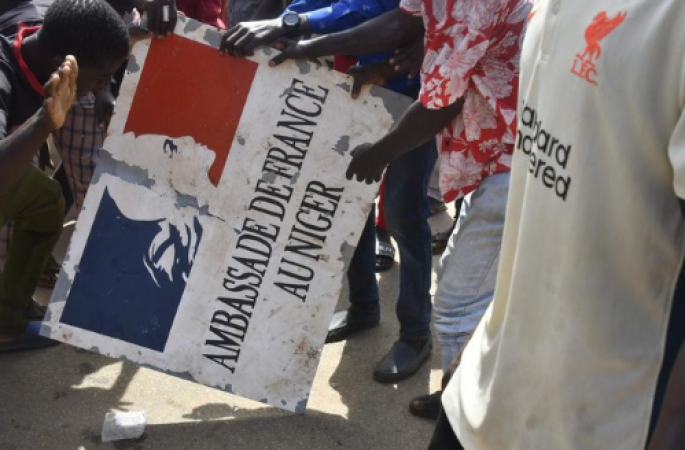
Niamey: Following disagreements with Mali and Burkina Faso and the third military coup in the Sahel in as many years, France is now witnessing its relationship with Niger deteriorate.
In its two neighbours, where elected leaders were ousted in 2020 and 2022, the same scenes that have played out in Niger since the July 26 coup have been eerily witnessed.
Crowds chanting anti-French and pro-Russian slogans turn their attention to France in each instance, the former colonial power and ally in the fight against extremism, who then receives verbal rebukes from the new junta.
Also Read: Niger Junta Flexes Power: Senior Politicians Detained in Post-Coup Crackdown
President Mohamed Bazoum was deposed last Wednesday by members of his guard. Bazoum was a key component of France's Sahel strategy.
The putschists claimed France was attempting to "intervene militarily" by plotting with the head of the Niger National Guard on Monday, one day after hostile protests outside the French embassy prompted a warning from Paris.
According to Ibrahim Yahaya Ibrahim, a researcher with the International Crisis Group (ICG) think tank, coups in the Sahel "are supported by a fringe of the population that have already shown a hostile attitude towards French or Western presence."
"Anti-French talk, or anti-French politics, have been around for a long time," a study by the French Institute of International Relations (IFRI) said last month. However, they have widely spread among the working classes, especially in urban areas, and are no longer restricted to the intellectual elite as they once were.
Also Read: Libyan Trafficking Warehouse Raid: Nearly 400 Pakistani Migrants Rescued in Daring Operation
Even prior to the coup, it appeared that there was little support for France's policies in Niger in the nation's capital Niamey, a stronghold of Bazoum opponents.
France was criticised for its diplomatic approach, which was seen as opaque or arrogant, and accused of failing to root out extremists who had been terrorising the nation since 2015.
Conspiracy theories have proliferated against this backdrop and in a nation where roughly two thirds of the population lacks literacy.
According to Rahmane Idrissa, a researcher at the African Studies Centre at the University of Leyden in the Netherlands, "opinion is widely held in the public that French troops are only going to conflict zones to provide arms for the extremists."
Unfortunately, you can't refute feelings by providing factual evidence because this idea "is not based on facts but on feelings."
Russia is charged by France with leading a defamation campaign, and the Sahel region has turned into a battleground for information.
By agreeing to host France's reorganised anti-extremist force in the Sahel after it left Mali last year after the Bamako regime imported Russian paramilitaries, Bazoum took a chance.
Amadou Bounty Diallo, a Nigerien analyst, claimed that "Bazoum teamed up with France over the head of public opinion."
In November 2021, protesters at Tera in western Niger blocked a French military convoy that was leaving Mali.
The French troops, according to the government of Niger, fired the shots that killed three of them.
Mr. Bazoum was unable to convince the Nigerien public that he had separate relationships with western partners because, in their eyes, he appeared to be very close to France, according to Ibrahim.
Also Read: From Summit to Serenity: Record-Setting Mountaineer Kristin Harila Embraces Life's New Heights
After winning the elections in 2021, Bazoum received praise from all over the world, paving the way for the first ever peaceful transfer of power in Niger.
With 55% of the vote, he defeated an opposition that had criticised the country's ties with France as being too cosy and complicit.
Although trade ties between France and Niger are currently "extremely thin," according to Alain Antil, director of the IFRI think tank's Sub-Saharan African Centre, France is a major donor of financial aid to Niger, which has since been suspended.
He claimed that Niger is no longer a strategic partner for uranium as it once was in the 1970s and 1980s.